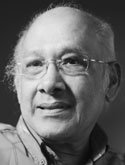In Memory Of My Father- Professor Sucharita Gamlath

By Sharmila Gamlath -March 31, 2015
My father, late Professor Sucharita Gamlath was one of the most prolific scholars of his time. During his lifetime, he continuously demonstrated his acumen in a range of fields, fulfilling the roles of author, teacher, literary critic, linguist, and political activist contemporaneously. He certainly needs no introduction among the general public of Sri Lanka. Since his demise on the 30th of March 2013, there have been many eloquent accounts of his contributions to the fields of Sinhala language and literature, literary criticism and political views. However, on the eve of his second death anniversary, I thought it would be apt to supply an insider’s account of his life to the large number of Sri Lankan whose lives he enriched with his work.
An obvious question that may emerge is why I did not write such a memoir as soon as he passed away or, at least, why I did not write one last year, in conjunction with his first death anniversary. In fact, several friends and family members did urge me to write an appreciation about him earlier. However, during a couple of previous attempts, I had tremendous difficulty dealing with the myriad of emotions that crossed my mind. Recently, when I spoke to a friend about this state of haziness I was experiencing, he reassured me that it is only human to feel that way. So I decided that was best to wait patiently till I was emotionally prepared to get down to this task. Now I am.
Sucharita Gamlath’s work ethic
It is worth pondering over what motivated my father to work so hard. I feel now that it was pure passion, the urge to keep utilizing his brilliance for as long as he could. The expected monetary payoff associated with his work was not a critical source of motivation for him. It makes me feel that scholars produce their greatest works when they engage in their activities with the sole intention of producing an outcome which challenges them, rather than treating a scholarly work like a pail of milk which can be sold and many things bought with the money. Engaging in scholarly work simply for extrinsic gains such as monetary rewards, career progress and recognition could sometimes negatively affect the quality of one’s work. The selfless gratification he got from engaging in his work was probably the magic formula for my father’s literacy success.
My father derived the greatest happiness from writing tirelessly. Usually, he organized his working day into three parts: he would generally get some writing -and perhaps reading- done before breakfast. After than he would sit at his writing table till lunch. After than he had a long nap, and after evening tea, he would go back to his writing and only stop at about 9.30pm.


